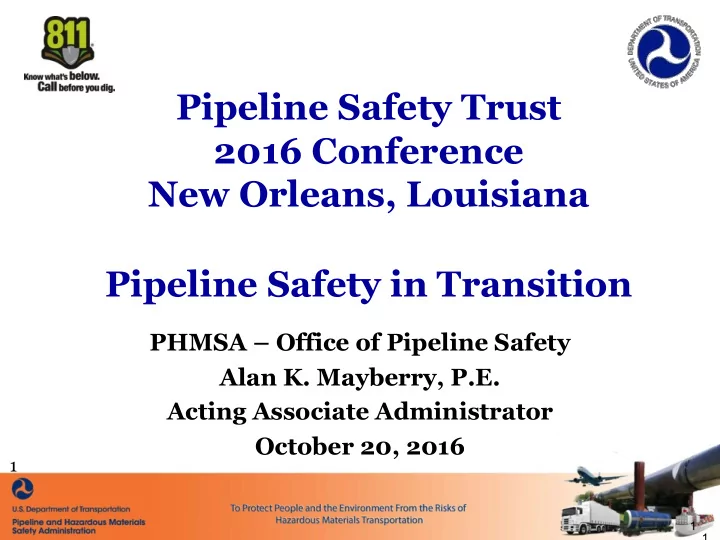

Pipeline Safety Trust 2016 Conference New Orleans, Louisiana Pipeline Safety in Transition PHMSA – Office of Pipeline Safety Alan K. Mayberry, P.E. Acting Associate Administrator October 20, 2016 1 1 1
History of IM Regulation, Outcomes, Concerns, and Recent Developments 2
Pipeline Safety with Context Measures (1988-2015) Index ¡ ¡ (1988 ¡= ¡1) ¡ Natural ¡Gas ¡Consump7on ¡ 1.4 ¡ Petroleum ¡Product ¡ 1.2 ¡ Consump7on ¡ 1.0 ¡ Pipeline ¡Mileage ¡ 0.8 ¡ U.S. ¡Popula7on ¡(Millions) ¡ 0.6 ¡ Major ¡Hazardous ¡Liquid ¡Spills ¡ 0.4 ¡ 0.2 ¡ Incidents ¡with ¡Death ¡or ¡ Injury ¡ 0.0 ¡ 1986 ¡ 1990 ¡ 1994 ¡ 1998 ¡ 2002 ¡ 2006 ¡ 2010 ¡ 2014 ¡ Data ¡Sources: ¡ ¡Energy ¡Informa?on ¡Administra?on, ¡Census ¡Bureau, ¡ ¡ Calendar ¡Year ¡ PHMSA ¡Annual ¡Report ¡Data, ¡PHMSA ¡Incident ¡Data ¡-‑-‑ ¡as ¡of ¡February ¡24, ¡2016 . ¡ 3
Bellingham (1999) Carlsbad (2000) 4
Integrity Management Regulation • Hazardous Liquid (2002) Gas Transmission (2004) • Prescriptive elements – HCA Integrity assessment (primarily ILI and Pressure Testing) – HCA Repair criteria • Management-based elements – Risk assessment – Preventive and mitigative measures (i.e., risk reduction) – Performance monitoring and continual improvement 5
Early IMP Experience • Operator program weaknesses – Risk assessment – Risk reduction measures – Expected maturation beyond initial effort did not happen • PHMSA weaknesses – Resource constrained – Inspectors had to adjust – Difficulty enforcing subjective regulations – Performance monitoring and continual improvement 6
San Bruno (2010) Marshall (2010) 7
Recent Learnings • Simplistic risk assessment methods • Inadequate consideration of key pipeline attributes – Age, design, material, coating, etc. – Welding and construction technique – Missing or questionable records – Lessons learned from other segments of system • Use of tools inadequate to address some threats (e.g., Direct Assessment) 8
Recent Learnings • Repair criteria and schedules allow too many sizeable and growing anomalies to remain in service for long periods • Poor analysis of discovered defects (rationalize not excavating defects rather than aggressively seeking to investigate and discover injurious defects) • Examples include: – Enbridge accident at Marshall, MI (e.g., interactive threats) – Plains accident at Santa Barbara, CA (e.g., significantly under called ILI indications and failure to validate tool performance) 9
Moving Toward Zero Accidents Zero Accidents Ultimately Relies on Operators Doing what is • Necessary, Regardless of Regulatory Requirements We Collectively Must Break the Cycle of Merely Responding to Most • Recent Incident PHMSA Supports and Endorses the Pipeline Safety Management • System (PSMS) – API 1173, Standard for Pipeline Safety Management System Requirements – PSMS is all about changing industry attitudes, mindset, and safety culture – Until each operator embraces and implements PSMS, the full effectiveness of IMP will not be realized 10
What Is PHMSA Doing? • Support and Encourage Serious Adoption of PSMS and a Culture of Safety • Revise Regulations to Address Areas of Poor Operator Performance • Strengthen Inspection and Enforcement • Fund Research and Development to Improve Assessment Technologies 1 1
The Right Mix • PHMSA continues to seek the right mix of prescriptive and performance based standards • Initial Integrity Management Program (IMP) rules were a major improvement, but … • IMP is still evolving. • PHMSA has proposed significant new changes to IMP in response to San Bruno and Marshall, MI – Hazardous Liquid NPRM (Nov 2015) 80 FR 61610 – Gas NPRM (Mar 2016) 81 FR 20722 1 2
Proposed IMP Rule Revisions • Management System Requirements – More detail regarding execution of management system aspects of IMP – Validate risk models and risk analysis results Prescriptive Requirements • – Technical aspects of evaluating discovered defects – Repair criteria Operator knowledge of pipeline attributes • – Accurate knowledge of pipeline – Accurate records – Technical approach to re-establish key attributes when unknown 13
Proposed IMP Rule Revisions • Expand Integrity Assessments to Non-HCA Areas – Require Integrity Assessments to substantial amounts of non-HCA pipe – Apply comparable repair criteria • Integrity Verification Process – Address “Grandfather Clause” – Address Legacy Pipe – Address Pipe Without Records 14
Improved Guidance • Risk Modeling Work Group – Joint group comprised of PHMSA and industry experts – Effective modeling of pipeline risk critical for successful integrity management and improved safety performance – PHMSA promotes the establishment of a mechanism for long term improvement and refinement of pipeline risk analysis “Big Data” • – Sophisticated Risk Models are only as Good as the Data Being Analyzed – Improvement of In-line and other pipeline assessment technologies depends on analysis of tool performance via detailed comparison of tool results with field measured as-found flaw characteristics – Pipeline Reauthorization Act, Section 10, Mandates that DOT Convene a Working Group to Develop a System for sharing “Big Data” for these purposes 15
PHMSA Internal Initiatives • Increased inspection staff • Reengineer inspection process – Data-driven, risk-informed – More investigative • Modernize tools – “Inspection Assistant” – Inspection planning – Documentation – Data capture 16
PHMSA Internal Initiatives • Accident Investigation Division – Multi-regional team of PHMSA investigators – Comprehensive procedure for investigating accidents – Incorporate learnings from previous accident investigations – Incorporate features to provide feedback and continual improvement • PHMSA 2021 Strategic Plan – Data Assessment and Strategy – Improvements to National Pipeline Performance Measures 17
Research and Development • Improve Assessment Technology R&D • Upcoming Event: November 16-17, 2016 Pipeline Safety R & D Forum – http://primis.phmsa.dot.gov/meetings/ 1 8
Zero Accidents • PHMSA takes each accident seriously • Continual improvement – Right balance between prescriptive and performance-based regulations – Collaboration with all stakeholders – Oversight performance – Data and analytics • Goal: ZERO Accidents 19
Thank You 20
Recommend
More recommend